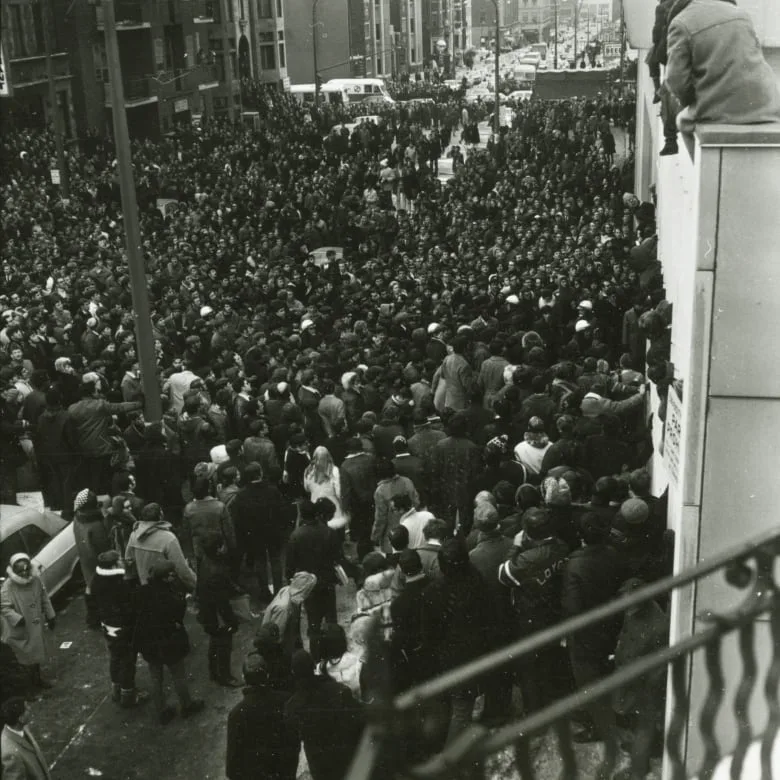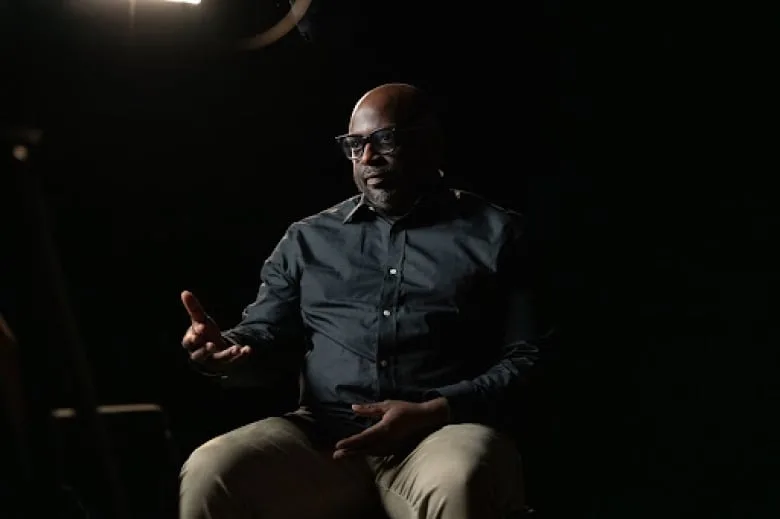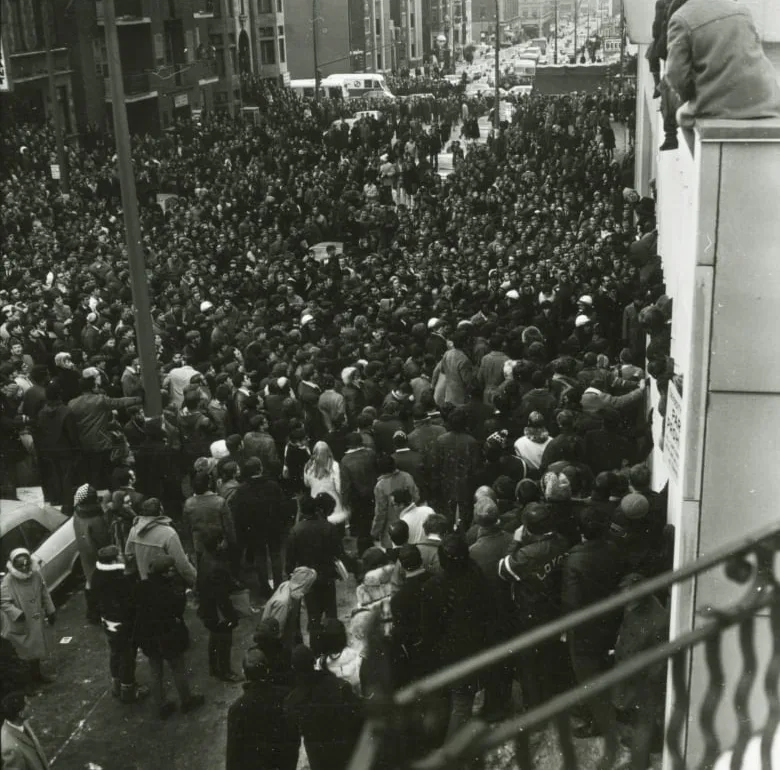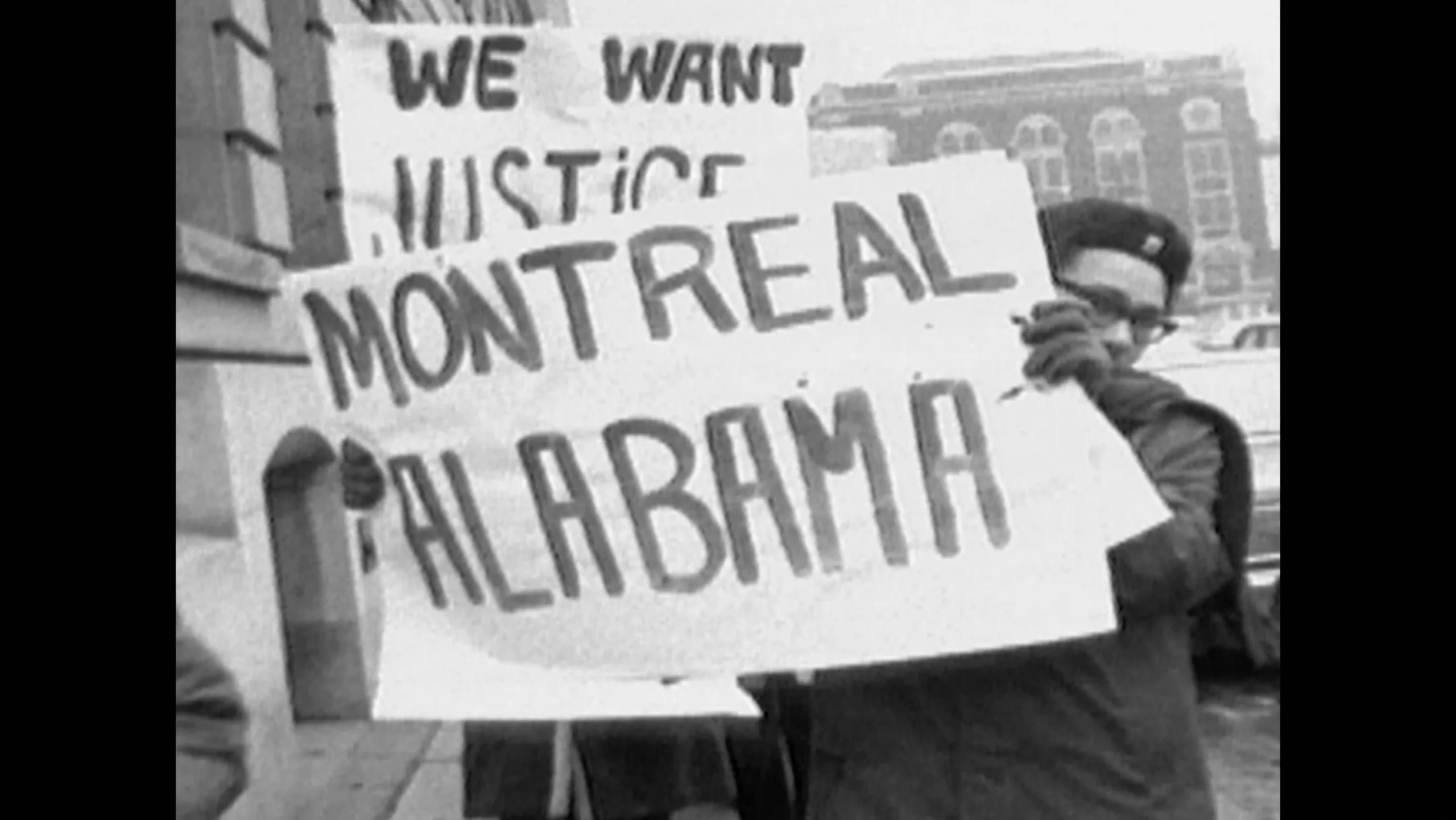
Black Life: Untold Stories reframes the rich and complex histories of Black people in Canada, dispelling commonly accepted myths and celebrating generations of Black Canadians while celebrating the contributions of both famous and lesser-known individuals. The eight-part series spans more than 400 years with an eye toward contemporary issues, culture, politics, music, art and sports.
This article is written by David Austin, a Montreal-based author featured in the ‘Revolution Remix’ and ‘Justice Denied’ episodes. Watch now on CBC Gem.
I was a teenager living in Toronto in the late 1980s when I first learned about the 1969 Sir George Williams affair in Montreal.
Sparked by an accusation of academic racism against a science professor at Sir George Williams University in April 1968, the occupation of the ninth floor of the university’s Hall Building — and accompanying street marches — was Canada’s first major Black-led student protest. It was arguably Canada’s most significant university protest in the 1960s, and an event that reverberated in the Caribbean and echoed in the U.S. and U.K.
The ’80s was a period of protest in its own right, a time when Black Torontonians mobilized against the Royal Ontario Museum’s “Into the Heart of Africa” exhibition for its colonial representation of the African continent. Many conversations about the exhibition occurred in Third World Books and Crafts on Bathurst Street, and it was there that I met writers and activists such as Norman (Otis) Richmond and Raymond Watts who discussed the politics and culture of the 1960s, including Sir George.
The late 1960s was a critical juncture in Canadian history
The Sir George Williams protest occurred at a critical juncture in Canadian history. For a moment, it shattered the myth of Canadian innocence that denied Canada’s history and legacies of colonialism and enslavement.
The ’60s were a time of political foment, a time when groups of diverse backgrounds spoke the language of freedom in relation to their specific struggles. It was a time when the ideas of Martinicans Frantz Fanon and Aimé Césaire inspired African Canadians, Indigenous people and French Canadians, leading the latter to appropriate the identity of nègres as their own.
In Montreal, Haitians and West Indians discussed Fanon, sometimes alongside French Quebecers whose poets also drew inspiration from Césaire, one of the great writers to grace the French language and arguably the single most influential figure among Quebec poets in the 1960s.
Featured VideoA clip from “Revolution Remix,” the second episode of CBC docuseries Black Life: Untold Stories, which explores two era-defining Black empowerment events in 1960s Montreal, including the Sir George Williams affair.
Indeed, Canada, and especially Montreal, was the site of competing nationalisms, including Canadian and Quebec nationalism, all of which shaped the tenor and tone of the Sir George protest.
While Quebec nationalism reached a fever pitch in the streets of Quebec with the emergence of organizations such as the Front de libération du Québec militating against Canadian Anglophone and American economic and cultural domination, English Canada not only celebrated its centenary in 1967, but also struggled to forge its own national identity in relation to its neighbour to the south.
Black Power movements
As Canadian and Quebec nationalists challenged America’s influence north of the 49th parallel, images of the civil rights and Black Power movements to the south inspired Canadians, and none more than people of African descent. Black and Caribbean nationalist movements emerged in the struggle against both racism in Canada and Canadian domination of banking and bauxite (the rock used to manufacture aluminum) in the Caribbean.
And then, in April 1968, Martin Luther King Jr. was gunned down in Memphis, Tenn. The memorial protest in the heart of downtown Montreal was organized by Adeline Chancy and Rosie Douglas and perhaps the first major Black-led mass mobilization of its kind in the city. This collective mourning of King’s martyrdom also highlighted racism in Canada, and it occurred at a time when several science students at Sir George launched their complaint, arguing that biology professor Perry Anderson had deliberately failed them because of their ethno-racial background.
The Sir George Williams University administration essentially dismissed the complaint and months passed without incident.
Smashed computers, a fire and arrests
After vain attempts to engage the university’s administration, the students occupied the ninth floor of the Hall Building, where Sir George’s mainframe computer was housed. On Feb. 11, 1969, believing that an agreement had been reached with the university, the protesters began cleaning up the computer centre, only to realize that the university had called in the riot police to put an end to the occupation. The end result was smashed computers, a fire that could have killed the occupants and almost 100 arrests.
From many accounts, the police brutalized many of the protestors who were in their custody. Politicians called for the punishment and deportation of the protestors. These politicians either failed or were unwilling to appreciate that Sir George offered Canada an opportunity to confront its past, including its history of colonization, slavery and de facto segregation.
Some of the students were tried and convicted, including Rosie Douglas and Anne Cools who served prison sentences for their role in the protest. Others were forced to return to the Caribbean, and while some were celebrated upon their return, others had a cloud of shame hanging over their heads.
The past haunts the present

‘Revolution Remix’ interviewee David Austin. (Studio 112/Northwood Entertainment/Ugly Duck Productions)
In many respects, it was my curiosity about Sir George and its surrounding events that brought me to Montreal — where I have now lived for over 30 years — as a university undergraduate in 1990. Curiosity about Sir George also helped to anchor me and other university students and activists in the 1990s as we sought to make sense of the world and our place in it.
Over the years, I’ve come to see Sir George as a gift that offers Canada a window into itself. It showed the brutal face of institutional racism and the scars left behind by the refusal to confront it. The problems of that time are very much present in our own.
In the aftermath of George Floyd’s murder in Minneapolis and amid the ongoing struggles for racial justice in Canada, unions, the media, students, professors, academic institutions, government agencies, the police and prisons, among other institutions, have been challenged to confront structural racism and its negative impact on the lives of people of African descent in Canada.
Black Canadians continue to be disproportionately unemployed, underemployed, overpoliced and overrepresented within the criminal justice system. This at least partly explains why hundreds would show up for two weeks of events commemorating the 50th anniversary of the Sir George protest organized under the banner of Protests and Pedagogy in 2019 at Concordia University. It is also part of what prompted Concordia to issue an official apology last year to those most affected by the university’s mishandling of the protest.
As I look at it today, Sir George also demonstrates possibilities.
As an exercise in Black self-organization against racial and economic domination, Sir George showed that a numerical minority has the capacity to influence the majority, or at least a large section of it; to at least temporarily trouble the established order of things; to influence how members of society think; and act to affect change for the better.
It also demonstrates the possibility of solidarity, or more accurately, common cause.
Approximately half of the arrested were white, and after his incarceration, Rosie Douglas would play a central role in cultivating Black and Indigenous solidarity across Canada. The kind of political will demonstrated by Quebec nationalists such as union leader Michel Chartrand and singer Pauline Julien, among others, all of whom lent their support to Black protestors, has since faded in Quebec, but their active support nonetheless represents a germ, a kernel of what might be when people commit to fight for the change that society sorely needs.
In many ways, the Black Life: Untold Stories series raises these poignant issues for a new generation in relation to our current political moment.
Today, as we continue to struggle against the myriad forms of social and economic inequality that have been exacerbated by a global pandemic, as we fight against the tide of environmental devastation and climate variation resulting in freakish forest fires and frequent storms that resemble micro tornadoes — in Canada — Sir George recalls the great American abolitionist Frederick Douglass’s maxim that without struggle, without fighting for change, there is no progress.
“Revolution Remix” is streaming now on CBC Gem. Watch it on CBC-TV on Nov. 1 at 9 p.m. (9:30 p.m. NT).
For more stories about the experiences of Black Canadians — from anti-Black racism to success stories within the Black community — check out Being Black in Canada, a CBC project Black Canadians can be proud of. You can read more stories here.





